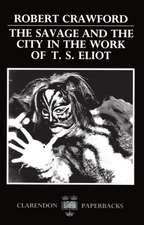The Image of the English Gentleman in Twentieth-Century Literature: Englishness and Nostalgia
Autor Christine Berberichen Limba Engleză Paperback – 3 oct 2016
| Toate formatele și edițiile | Preț | Express |
|---|---|---|
| Paperback (1) | 338.33 lei 43-57 zile | |
| Taylor & Francis – 3 oct 2016 | 338.33 lei 43-57 zile | |
| Hardback (1) | 821.82 lei 43-57 zile | |
| Taylor & Francis – 28 dec 2007 | 821.82 lei 43-57 zile |
Preț: 338.33 lei
Preț vechi: 401.86 lei
-16% Nou
Puncte Express: 507
Preț estimativ în valută:
64.76€ • 70.37$ • 54.43£
64.76€ • 70.37$ • 54.43£
Carte tipărită la comandă
Livrare economică 21 aprilie-05 mai
Preluare comenzi: 021 569.72.76
Specificații
ISBN-13: 9781138246812
ISBN-10: 1138246816
Pagini: 218
Dimensiuni: 156 x 234 mm
Greutate: 0.45 kg
Ediția:1
Editura: Taylor & Francis
Colecția Routledge
Locul publicării:Oxford, United Kingdom
ISBN-10: 1138246816
Pagini: 218
Dimensiuni: 156 x 234 mm
Greutate: 0.45 kg
Ediția:1
Editura: Taylor & Francis
Colecția Routledge
Locul publicării:Oxford, United Kingdom
Cuprins
Contents: Part I The Gentleman, Englishness and Nostalgia: Approaches, Explanations, Definitions: The gentleman - an elusive term; From knight to public-school boy - following the gentleman through the ages; A popular literary trope - a brief history of the gentleman in literature. Part II Of Heroes, Survivors and Dinosaurs: The Gentleman in 20th-Century Literature: The survival of the gentleman - Siegfried Sassoon, England and the sporting gentleman; Dancing to the music of Widmerpool - the gentleman in Anthony Powell's A Dance to the Music of Time; Arcadia revisited? Evelyn Waugh's gentlemen; A pillar upholding nothing: nostalgia, Englishness and the English gentleman in Kazuo Ishiguro's The Remains of the Day. Part III The End of the Line?: Regression and reaction: past realities and future possibilities; Bibliography; Index.
Notă biografică
Christine Berberich is Senior Lecturer in English Literature at the University of Portsmouth, UK.
Recenzii
'Lucid, persuasive, and highly accessible ...Christine Berberich's penetrating and sometimes controversial analyses show how deep-rooted the idea of the gentleman still is in English literature and culture'. Patrick Parrinder, University of Reading, UK ’Another excellent book on the subject ... there is a particularly delightful chapter on Siegfried Sassoon's First World War trilogy ... (Berberich) always has interesting and novel things to say on the subject. ’ A.N. Wilson, The Daily Telegraph ’Berberich's critical analysis is based on sound evidence and thorough knowledge of her subject. As a survey of Sassoon and Powell in particular, this book gives a good grounding in the nuances of the social history that are so important to an understanding of any aspect of the English class system in literature.’ The Times Literary Supplement ’In lucid and astute interpretations, Berberich foregrounds literary texts as repository of both stereotypical ideas of Englishness and commonalities inherent in the English character. Equally, the book has the merit of marrying structure and content, rigor and empathy, eloquence and systematicity. Its didactic and methodical character recommends it as a suitable coursework bibliography.’ American, British and Canadian Studies ’... whatever historical resonance may infuse the figure of the gentleman, Berberich makes a memorable and often brilliant case for its continuing vitality ... In fact, the single greatest merit of Berberich’s study may lie in her ability to read the seemingly simple figure of the English gentleman in such an astute, imaginative, and many-sided manner, ultimately demonstrating... that the ideal of the gentleman "has not only fashioned men throughout the decades but has itself proven to be - in both meanings of the word - a fashionable ideal".’ Modernism/Modernity ’Ultimately the strength of Berberich’s book is in her treatment of the gentleman as he appears in the half century betw
Descriere
Christine Berberich shows that the English gentleman has proven to be a remarkably adaptable and relevant ideal that continues to influence not only literature but other forms of representation, including the media and advertising industries. Paying particular attention to the relationship of nostalgia to 'Englishness', Berberich demonstrates that twentieth-century depictions of the gentleman have much to tell us about rapidly changing conceptions of national, class, and gender identity.


















